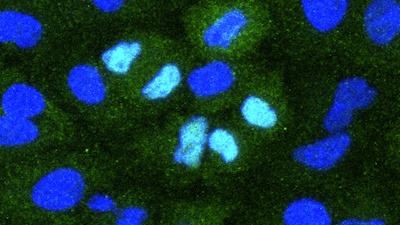- Cancer
- Coronaviruses including SARS-CoV, SARS-CoV-2, MERS-CoV
- Multiple strains of influenza A
- Fungal, bacterial, and/or parasitic pathogens

Immunostimulatory RNA Therapeutic for Treatment of Cancer and Infectious Disease
Immunostimulatory dsRNAs safely activate the body’s immune system to treat and prevent cancers and other conditions
Want to license this technology?
We are actively seeking a commercial partner with experience in RNA therapeutics and targeted drug delivery to help rapidly commercialize this technology.
Bioinspired Therapeutics & Diagnostics
Want to license this technology?
We are actively seeking a commercial partner with experience in RNA therapeutics and targeted drug delivery to help rapidly commercialize this technology.
The Problem

Cancer and infectious diseases are wily foes, able to rapidly mutate to evade the body’s immune defenses. The recent success of immunotherapy drugs that target the body’s immune system rather than specific diseases themselves has ushered in a new era of leveraging our own biology to combat health threats. However, the innate immune system is largely driven by the action of interferons (IFNs), which can cause deadly cytokine storms and other risks. Therapeutics that can safely target the innate immune system would offer an entirely new “disease-agnostic” approach to prevent and treat a broad range of diseases.
Our Solution
Wyss researchers have discovered a new class of immunostimulatory double-stranded RNAs (dsRNAs) that produce anti-cancer and pan-antiviral activity by inducing the expression of multiple types of IFNs. dsRNAs have potent anti-cancer effects, as daily treatment resulted in significant inhibition of tumor growth in a mouse melanoma model. They can also effectively inhibit infection of human lung cells by a wide range of viruses including SARS-CoV-2, influenza A, and even common cold viruses, and reduced SARS-CoV-2 infection in a mouse COVID model by up to five orders of magnitude. Importantly, dsRNAs do not cause an increase in pro-inflammatory cytokines, making them safer for humans.
These novel dsRNAs can be administered intravenously for cancer treatment, and via inhalation or intranasally for prophylactic or therapeutic treatment of infectious diseases. They can be used to treat bacterial, fungal, and parasitic infections, and could serve as an adjuvant to enhance the efficacy of existing vaccines.
Project Journey
First discovered during efforts to find an effective treatment for COVID-19 during the pandemic, dsRNAs are being advanced at the Wyss Institute for both cancer and infectious disease. From a commercial perspective, these molecules are short (20-27 base pairs), fully chemically defined, and easily synthesized, making them easy to manufacture commercially. By acting to enhance generic host immune responses independent of disease-specific mechanisms, these drugs could represent an entirely new class of innate immunotherapeutics for a broad range of diseases.
This technology was named a 2023-2024 Validation Project., and in 2024 received an award for up to $27M from the Advanced Research Projects Agency for Health (ARPA-H) to develop new RNA-based therapeutics, advanced delivery vehicles, and manufacturing capabilities to treat cancer and infectious diseases. Several patents covering this technology are currently pending.
Want to license this technology?
We are actively seeking a commercial partner with experience in RNA therapeutics and targeted drug delivery to help rapidly commercialize this technology.